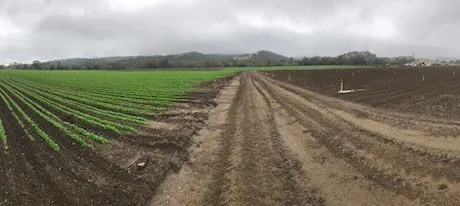For a period of five days over the last week, most of California saw extremely heavy rainfall, resulting in mud slides and flooding across the state. The heaviest of the rain was concentrated mainly along the length of the coast, while mountain areas recorded heavy snow.
Strawberries affected
One of the major impacts occurred to strawberries. While it's a slower season for strawberries in California, there are notable volumes coming out of regions from Santa Maria, Oxnard and further south. Most of this region experienced heavy rainfall and growers are reporting a drop in production, even as far south as Baja in Mexico, due to exceptionally wet and muddy fields. This means that strawberry supplies will be tight over the next couple of weeks, which is critical given that the busy Valentine's Day push is imminent.
"Producers have not been able to harvest and ship strawberries for several days and there is a critical shortage of berries," said Cecilia Aguierre of The Berry Man, a produce distributor on the Central Coast. "There has already been a shortfall in supply due to cooler and wetter weather over the last few weeks, but the rain over the weekend has created an even tighter market. Prices are very high right now and it doesn't look like they will decrease anytime soon."
Upcoming strawberry programs are also being affected. The expectations are for harvests to be delayed as the cold and wet weather takes its toll. However, things are looking promising from the end of the month. "Due to the combination of rain and cold weather conditions, fruit production in California will have a slower start and is expected to stay light through the next week," noted Jerry Moran, Senior Director of Sales – Strawberries at Naturipe Farms. "Our overall program will start to pick up once we enter the last week of February with stronger volumes in March between Oxnard and Santa Maria. March introduces several opportunities for spring promotions and strawberry product display contests."

Muddy conditions slow vegetable harvests
Vegetable crops have also been affected in a similar fashion. Derek Sass of Talley Farms said his company is currently growing Asian vegetables like Napa cabbage and Bok Choy, as well as herbs, kale, spinach, and Brussels sprouts in Arroyo Grande, just outside of Santa Maria. Sass said that quality has not been affected, but growers have had to cease harvesting on a number of occasions due to the very wet and muddy conditions.
"In our region, we have received a little over four inches of rain over five days," he shared. "It's very abnormal but the rain has not affected us quality-wise, although it has dramatically slowed down harvesting. It hasn't caused flooding because the soil has absorbed the water effectively, but it has made the fields very muddy and we are having difficulty accessing them with machinery. We have only been able to harvest at about half our normal rate and this is having a chain reaction as it becomes difficult to fill all our orders."
There is currently a dry spell before more rain is due to come back. "The forecast is for more rain in a week," Sass noted. "The fields should have an opportunity to dry out before then. Additionally, the next round of rain is not expected to be as heavy as what we just experienced. In the long-term, it's certainly good as we need the water. It just makes it hard for our day-to-day activities."
Desert areas received only moderate amounts
At this time of year, a significant amount of commercial vegetable production - especially leafy greens - occurs in the desert areas, such as the Imperial Valley. This area of the state received only moderate rainfall and growers here said that the rain was beneficial.
"We are not receiving the heavy rains that have been falling on other parts of California," noted Donald Alford of Altar Produce in Calexico. "What rain we are getting has been beneficial for our asparagus crop. It's just in the right amount and is offering a free shot of nitrogen to the soil to help it along."
For more information:
Cecilia Aguierre
The Berry Man
Ph: +1 (805) 965-3772
admin@theberryman.com
www.theberryman.com
Jaqueline Padilla
Naturipe Farms
Ph: +1 (831) 443-2354
jpadilla@naturipefarms.com
www.naturipefarms.com
Derek Sass
Talley Farms
Ph: +1 (805) 489-5400
derek@talleyfarms.com
www.talleyfarms.com
Donald Alford
Altar Produce, LLC
Ph: +1 (760) 357-6762
alford@altarproduce.com
www.altarproduce.com
